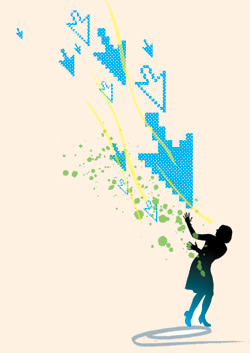Who should control your online identity?


Roula Khalaf, Editor of the FT, selects her favourite stories in this weekly newsletter.
Last week I suffered a minor rite of passage on the internet. An anonymous cyber being (or beings) logged into Wikipedia, the online encyclopedia, and edited a brief biography about me, with some surprising results. Most notably, a lengthy passage was inserted that complained I had not given enough credit to academic anthropologists in my work in recent years. For good measure, this cyber editor (who I would guess might have been a mildly disgruntled anthropologist) also pointed out that I had once accused academic departments of anthropology of committing “intellectual suicide”, by their introspection.
Now, as cases of so-called “Wiki vandalism” go, this is extremely mild. Nobody inserted anything malevolent or obscene, or claimed that I was dead, say. The references are factually accurate. But the edit makes my biography look a little lopsided. (As it happens, I usually face criticism for writing too much about anthropology, not too little.) And in practical terms, this incident leaves me grappling with a very modern challenge: to what degree should any of us care about how we are presented online? And is there anything we should or should not do about it?
It is a growing issue, not just for the newer social media but also for established sites such as Wikipedia. When Wikipedia was first established as an online encyclopedia, more than a decade ago, co-founder Jimmy Wales took pride in the fact that the website was “democratic”. Anybody can create a Wikipedia page but a sense of communal oversight is supposed to ensure accuracy. As the website points out: “Throughout its history, Wikipedia has struggled to maintain a balance between allowing the freedom of open editing and protecting the truth and accuracy of its information … [but] vandalism is easy to commit on Wikipedia because anyone can edit the site.”
In fact, vandalism is not a problem for most pages: the majority seem accurate. But some are constantly being re-edited in strange or malicious ways. Pages linked to Israel, for example, are targeted. So are others about Mali, Kazakhstan and Uzbekistan, along with the biographies of people such as Ron Paul, John Kerry, Pope John Paul II, Donald Trump, Justin Bieber and Jay Leno. This “vandalism” has sometimes had comic results: Ted Kennedy, Robert Byrd and Kanye West have each been falsely declared to be dead; and Rolling Stone’s website once published a false story about Halle Berry on the basis of a vandalised Wiki page – or so Wikipedia claims.
Wikipedia itself is trying to fight back. It now locks pages that get frequently attacked, implements so-called “recent change” patrols, and places suspicious sites and users on a watchlist. But what is notable now is that consumers – especially celebrities – are increasingly fighting back too, developing tools to shape their profiles online.
…
Much of this business is furtive. One senior banker I know, for example, asked consultants a few years ago to “drown” a series of damaging pieces about her on Google. Apparently they did this by quietly filling the internet with so many positive items that the damaging material was pushed to the bottom of the search results. Other thin-skinned celebrities have taken a more direct approach – and tried to force internet sites to take down damaging material. And public relations companies have a host of cyber tricks at their disposal too. For an account of this, read Ryan Holiday’s mesmerising account of his time in this business, called Trust Me, I’m Lying , which explains how PR people can secretly manipulate blogs, chat rooms and other social media sites to protect or promote reputations.
Strikingly, the issue is so widespread that some companies no longer feel any need to hide. Take the case of a company called Reputation.com. It claims to have “over one million customers” and proudly advertises the fact that it sells tools to enable people to “combat negative material by pushing it down and out of sight” on social media platforms. Or, as its promotional flyer explains: “If your reputation is critical to your livelihood, such as a doctor, lawyer, executive, or celebrity, then it’s in your best interest to protect your name. [We] offer proven tools to suppress negative online material with positive content you control.”
As a journalist I certainly don’t approve of these covert or overt games. On the contrary, the fact that my “new” Wiki page has been “democratically” edited – possibly by an anthropologist harbouring a cause – makes me chuckle. And that list of books I have failed to cite is a refreshing reminder of how much more I need to learn – and read. But the incident is also a humbling sign of the degree to which we are all vulnerable to the intervention of other beings in cyberspace. And, of course, of the fact that none of us usually notices this vulnerability – until it suddenly hits us in the most unexpected ways.
Comments